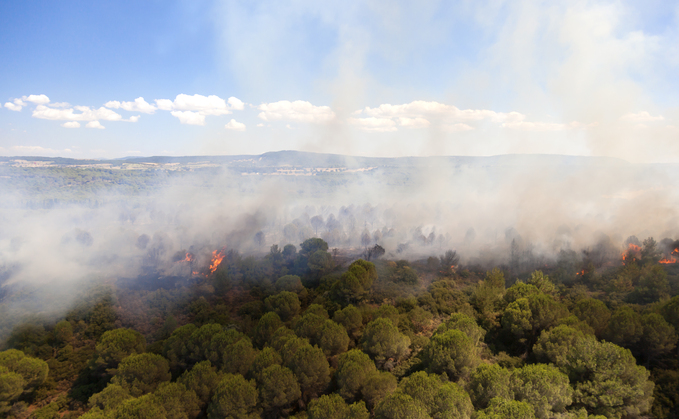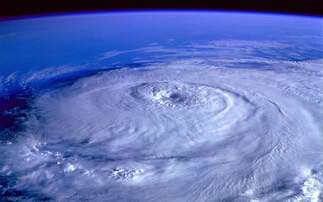
The most granular and empirical analysis to date of the projected economic impact of worsening climate damages is so terrifying because the scenarios it explores are so plausible
I've reported on more than my share of apocalyptic climate reports, but yesterday's new analysis from the Potsdam Institute on the projected economic impacts of climate change is one of the bleakest yet.
The headline conclusions are bad enough. It estimates climate damages are likely to reach $38tr a year by 2050 and could get as high as $59tr. Even if the world starts to rapidly decarbonise, climate impacts are likely to knock 19 per cent off projected per capita incomes and 17 per cent off GDP by mid-century. Fail to curb emissions - and they are still currently rising - and we could see incomes trimmed by 60 per cent by 2100. Decades of sluggish growth and permanent austerity loom. It could be argued they have already started.
All that is bad enough, but it is also broadly in line with numerous other sobering models that attempt to predict climate impacts. What makes this report blood-freezing-in-the-veins terrifying is how robust and plausible it feels.
The methodology is not based on climate models alone, but analysis of thousands of historic climatic impacts. We know that when a hurricane hits a developing economy it can put development back by years as funds are channelled into reconstruction. So what happens if we take those proven impacts and apply them to hurricanes that are expected to come with ever greater intensity? The answer is trillions of dollars worth of economic development foregone.
Moreover, the core projections only run through to 2050. They are based on climate scenarios we have a very high degree of confidence in, not longer term estimates that will be hugely influenced by what happens to emissions in the next few decades.
The results are also conservative. Some of the 'let's just adapt' crowd will look at a projected 19 per cent off incomes and argue that when global GDP tends to double every 25 years, we will still be richer by mid-century than we are now.
That is true, but such a modest reduction in projected incomes is based on the world getting onto a decarbonisation trajectory that keeps temperature increases below 2C. We are currently on track for 3C. Trimming projected incomes by 40 per cent or more would condemn the global economy to growth so slow it would feel like stagnation. The impacts would be worse for the poorest countries that have been unable to build out the climate resilient infrastructure needed to build on the development of the past 50 years. The political and humanitarian fallout would be disastrous.
And then there is the risk of tipping points - in the past few days there have been fresh reports on permafrost melting, coral bleaching, and ocean currents faltering - and the not inconsequential threat of climate impacts triggering catastrophic geopolitical outcomes. Does the world currently feel ready to handle hundreds of millions of climate refugees? The worst case scenarios are worse still.
Which brings us to the scariest aspect of the report - the way its putative models are echoed in the real world.
Any attempt to model the future is inherently uncertain. The world is complex place littered with known and unknown unknowns. Alarming projections have proven to be wrong in past, albeit often because the initial warnings of disaster were heeded.
But the latest warnings of future economic damages come in a week when Dubai Airport is currently underwater following the worst rain in 75 years, climate-shaped geopolitical tensions are ratcheting upwards, and the press is full of stories of harvests failing across Europe. The recent slowdown in food price inflation could prove worryingly short-lived.
Projected climate damages of $38tr a year sounds lot, but they could end up being a good result if we are entering an era when harvests cannot be relied upon and once in a century extreme weather is the new normal. Anyone dismissing these threats is severely lacking in imagination, not to mention basic principles of risk management. We may be able to adapt, we have done in the past, but the contention we can easily adjust to climate impacts unprecedented in the history of humanity is completely untested.
There is scant good news to be found here. The only silver lining is that the economic impacts are becoming so obvious, so visceral, that the argument that it is cheaper to decarbonise than it is to try and ride out rolling climate disasters is becoming self-evidently correct. This week's report reckons climate damages are set to be at least six-fold higher than the investment needed to get to net zero emissions. And those are the damages that are now likely locked in even if we do decarbonise. Fail to act and the costs will prove to be much higher. Treasuries and businesses the world over should take note.
Is climate change an existential threat or simply a very severe challenge? I'd argue it is closer to the former than the latter, but ultimately who cares about what is an essentially philosophical question? It is undoubtedly one of the gravest threats to human prosperity and happiness in the history of civilisation. And we have the technologies and solutions we need to avert the worst case scenarios and build something much better than a polluting economic system that threatens to fail on its own terms. We should use them, and fast.
A version of this article first appeared as part of BusinessGreen's Overnight Briefing email, which is available to all BusinessGreen Intelligence members.








